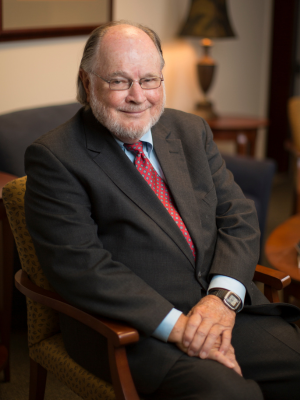In Memoriam: Dr. John D. Bower

The Medical Center extends its sympathy to the family of a former faculty member in appreciation for the loved one’s contributions to the academic health sciences center.
Dr. John D. Bower
Dr. John D. Bower, whose pioneering work in renal care and dialysis helped save untold numbers of lives, died on May 1, 2023. He was 91.

Bower joined the University of Mississippi Medical Center in 1965 as an instructor in medicine. By 1990, he had become chief of the Division of Nephrology. His legacy at the institution includes endowed chairs in nephrology and population health nursing. Those are just a couple of the many prestigious honors, institutions or gifts that bear his name.
Among the most salient is the Medical Center’s newest school. The John D. Bower School of Population Health was founded in 2016 with help through a $5 million gift from Bower’s foundation.
Dr. LouAnn Woodward, vice chancellor for health affairs and dean of the UMMC School of Medicine, said Bower was a great friend and supporter of the Medical Center, and he made a tremendous impact on health care in the state.
“Dr. Bower spent his life advocating for the needs of Mississippians. He and his daughter, Anne Bower Travis, worked tirelessly on behalf of our state’s citizens to make sure current and future generations had the resources necessary to lead healthier lives. We should all follow Dr. Bower’s powerful example and honor his memory by continuing to work toward improving the health of Mississippians.”
Born on Nov. 14, 1931 in Westfield, Massachusetts, Bower grew up in Virginia. He served four years in the U.S. Navy before entering the University of Lynchburg, graduating in 1957.
In 1961, Bower received his medical degree from the Medical College of Virginia/Virginia Commonwealth University School of Medicine. In a 2010 interview, he said he knew as a third-year medical student that he wanted to be a teacher, and to “understand the mechanisms of diseases.”
As a medical student, he worked as a research assistant in a physiology lab. Upon graduation, he completed an internship at the University of Virginia before returning to MCV for his residency and a nephrology fellowship. For two years, he worked in the college’s Kidney Transplant Research Program. Not long after he and his mentor, Dr. David Hume, had established an artificial kidney unit, Bower was on his way to Mississippi.
At UMMC, he did hypertension research with Dr. Arthur Guyton but soon migrated to renal research because of the demand for artificial kidney services.
Bower was instrumental in starting the state’s first dialysis unit, in 1966 at UMMC. Because many patients could not afford this life-saving treatment, he and a handful of other physicians persuaded Congress to extend Medicare coverage to patients with end-stage renal disease.
That led to a demand that eclipsed the number of existing units. In response, Bower and his staff ensured that dialysis became much more accessible by founding Kidney Care Inc., creating dialysis facilities and services within easy driving distance for any patient. Over the years, the number of kidney units swelled to more than 20 cities in three states.
At one time, Kidney Care served more than 2,000 people in Mississippi, or half of those needing dialysis. Proceeds from his work with dialysis programs eventually funded the creation of what is now the Bower Foundation.
The foundation helped establish the Bower School of Population Health, only the third school of its kind in the country. The school’s current dean is Dr. Thomas Dobbs.
“Dr. Bower was a powerful force for positive change, not only through his medical career but also through his charitable foundation,” said Dobbs, a professor in the departments of Health Administration, Infectious Diseases, and Population Health Science.
“He will be greatly missed.”
Bower’s dedication to public health was reflected by a $3.8 million grant from the Bower Foundation to fund graduate education for 64 registered nurses through the RN-to-MSN program at the UMMC School of Nursing. The program, Building a Strong Future for Nursing in Mississippi, ultimately seeks to boost the number of nurses in the state by training more nurse educators.
“Mississippi and access to health care were close to Dr. Bower’s heart,” said Dr. Julie Sanford, dean of the School of Nursing. “His legacy will be one of care and compassion, lived out through the care of countless patients.”
The foundation has supported initiatives for research, education, clinical care and telemedicine. It gave life to the UMMC Center for Bioethics and Medical Humanities, which administers, among other things, the Retired Doctors Breakfast Club, aka, Breakfast with Bower.
Created in 2000 with a foundation gift, the breakfast was Bower’s idea, inspired by the loneliness of a friend whose life was the Medical Center.
“He established the breakfast group as a small way to help keep retirees intellectually engaged and in contact with the Medical Center,” said Dr. Ralph Didlake, director of the Center for Bioethics and Medical Humanities. “I am pretty sure it is the only endowed breakfast in the state.”
During his own retirement, Bower accepted more awards and accolades. For his work with kidney patients, he received UMMC’s first-ever Vanguard Award in 2006, the year he was also awarded the Hope Award for Outstanding Community Service.
In August 2017, he was inducted into the University of Mississippi Medical Alumni Chapter Hall of Fame. “The No. 1 thing in my life,” he said during his acceptance speech, “has always been the patients.”


